Festember is a cultural festival organised at National Institute of Technology, Tiruchirappalli (NITT). It is a 4-day event held annually in the third week of September. It was first incepted in 1975 by then students of NITT, and has now evolved to be one of the largest cultural festivals organised by a student community in Southern India. With humble beginnings as a fest with zero rupee budget allocation, it grew rapidly with sponsorships and collaborations. It now boasts an annual participation of more than 15,000 students from over 500 collegiate student communities across India.

Plastic recycling is the processing of plastic waste into other products. Recycling can reduce dependence on landfill, conserve resources and protect the environment from plastic pollution and greenhouse gas emissions. Recycling rates lag behind those of other recoverable materials, such as aluminium, glass and paper. From the start of plastic production through to 2015, the world produced around 6.3 billion tonnes of plastic waste, only 9% of which has been recycled and only ~1% has been recycled more than once. Of the remaining waste, 12% was incinerated and 79% was either sent to landfills or lost to the environment as pollution.

The culture of Chennai, popularly called the "Gateway to the South India", is distinct from that of any other Indian city. Being a cosmopolitan hub, the city's culture reflects its diverse population that has resulted in a unique blend. Though a modern metropolis, Chennai continues to be traditional and conventional in certain ways. Traditional music, dance and all other art forms of Tamil Nadu are very popular in the city. One can find a peculiar cultural blend in city, from traditional foods to fast foods, from ancient temple architecture to modern high-rises, and from classical music and dance to the growing nightlife.
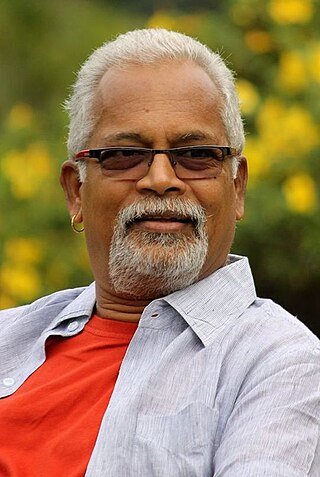
Charu Nivedita is a Tamil writer based in Chennai, India. His novel Zero Degree (1998) was translated into English in 2013 and longlisted that year for the annual Jan Michalski Prize for Literature. It was also selected or the prestigious 50 Writers, 50 Books - The Best of Indian Fiction, published in 2013 by HarperCollins.

Madras Day is a festival organised to commemorate the founding of the city of Madras in Tamil Nadu, India. It is celebrated on 22 August every year, 22 August 1639 being the widely agreed date for the purchase of the village of Madraspatnam or Chennapatnam by East India Company factors Andrew Cogan and Francis Day from Damarla Venkatadri Nayaka, the viceroy of the Vijayanagar Empire.

Chennai Book Fair is an annual book fair organized in Chennai, India by the Booksellers and Publishers Association of South India (BAPASI). The fair typically lasts for about two weeks during the New Year-Pongal season, that is between the last week of December and the third week of January. It is the second largest book fair in the country after the Kolkata Book Fair. All major Tamil and English publishing houses participate in this fair. It is considered an important event in the Chennai cultural calendar along with the Chennai music season.

Thodur Madabusi Krishna is an Indian Carnatic vocalist, writer, activist, author and Ramon Magsaysay awardee.
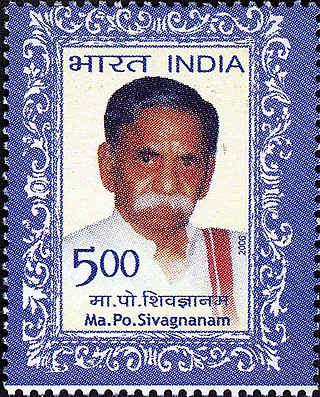
Mylai Ponnuswamy Sivagnanam, popularly known as Ma.Po.Si., was an Indian politician, freedom fighter, and the founder of the political party Tamil Arasu Kazhagam. He wrote more than 100 books.
A.R. Venkatachalapathy is an Indian historian, author and translator who writes and publishes in Tamil and English. Currently he is a professor at the Madras Institute of Development Studies (MIDS). He is noted for collecting and publishing the works of Tamil writer Pudhumaipithan.
Thoppil Mohamed Meeran was an Indian Nagercoil based author who wrote in Tamil.

Saarang is the annual social and cultural festival of IIT Madras. It is a 5-day long festival usually in the second week of the year. Founded in 1974, Saarang is the second oldest college festival in India. It was started in the name of 'Mardi Gras' with a small number of quizzes and music events. It adopted the name 'Saarang' and grew with the help of corporate sponsorship, collaboration with large-scale event organizers and international artists.

Plastic pollution is the accumulation of plastic objects and particles in the Earth's environment that adversely affects humans, wildlife and their habitat. Plastics that act as pollutants are categorized by size into micro-, meso-, or macro debris. Plastics are inexpensive and durable, making them very adaptable for different uses; as a result, manufacturers choose to use plastic over other materials. However, the chemical structure of most plastics renders them resistant to many natural processes of degradation and as a result they are slow to degrade. Together, these two factors allow large volumes of plastic to enter the environment as mismanaged waste which persists in the ecosystem and travels throughout food webs.
Anees Salim is an Indian author known for his books like Vanity Bagh, The Blind Lady's Descendants and the Small Town Sea. He is from the town of Varkala, and now lives in Kochi, Kerala. He won the Sahitya Akademi Award for The Blind Lady's Descendants in 2018, becoming only the fourth Malayalee in history to win the award for an English work. Some of his columns have appeared in newspaper The Indian Express.
Bottled water bans have been proposed and enacted in several municipalities and campuses everywhere over such concerns as resource wastage, transportation emissions, plastic litter, and damage to affected aquifers.
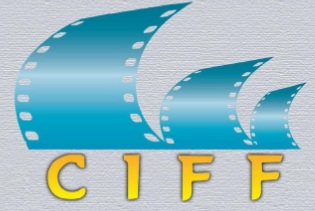
The Chennai International Film Festival (CIFF) is a festival organised in the city of Chennai, India, by a film society, the Indo Cine Appreciation Foundation (ICAF), with the support of The Government of Tamil Nadu, the South Indian Film Chamber of Commerce and the Film Federation of India.

The 2015 National Games of India, also known as the 35th National Games of India and informally as Kerala 2015, was held from 31 January 2015 to 14 February 2015 across seven districts of Kerala, India. It was the second time that Kerala hosted the national games, the first being when it hosted the 27th National Games in 1987.
Plastic roads are paved roadways that are made partially or entirely from plastic or plastic composites, which is used to replace standard asphalt materials. Most plastic roads make use of plastic waste a portion the asphalt. It is currently unknown how these aggregates will perform in the mid- to long-term, or what effect their degradation might have on surrounding ecosystems.
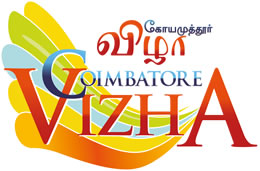
Coimbatore Vizha is an annual festival of Coimbatore, India. The nine day event seeks to bring together all citizens to celebrate the perennial spirit of Coimbatore.
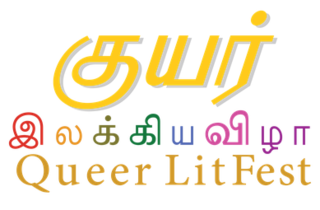
The Queer LitFest, Chennai (QLF), also known as Chennai Queer LitFest is an annual literary festival which takes place in the Indian city Chennai, Tamil Nadu. The first edition of the Chennai Queer LitFest was organised in July 2018. Kavikko Convention centre serves as the main venue of the festival.

Queer Chennai Chronicles, also known as QCC is an Indian LGBT literary organization that aims to promote lesbian, gay, bisexual, transgender and queer literature through programs that encourage development of aspiring writers and through annual Queer LitFest, Chennai.














